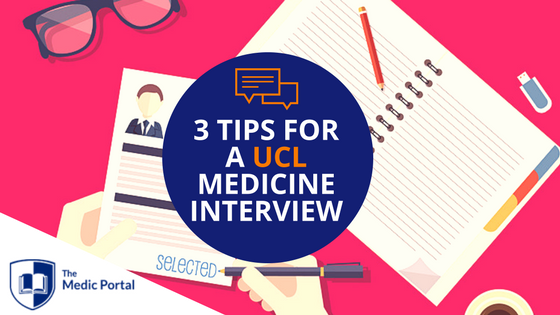
Looking for top tips for a UCL medicine interview? You’ve come to the right place!
Interview format: Traditional
Applying to Medicine for 2018 entry? Book a space on our newly announced Interview Courses!
Book an Interview CourseI remember sitting in the car on the way to my interview at UCL frantically searching for specific interview tips to no avail. I was terrified, and must have read through my personal statement about thirty times to try and construct answers to questions that hadn’t been asked yet.
Every single part of the interview process was terrifying, apart from one thing – the actual interview. My interview at UCL was the most relaxed interview I had. Of course, it was still very formal and rather intimidating, but I felt like I was talking to one of my teachers. Hopefully, you will have the same experience as I did, so here are a few tips to make sure that you do!
1. Try to remember what happened in your BMAT
As far as I know, the BMAT essay forms part of every UCL medicine interview, but the amount of time you spend on it is down to the interviewer. This section gets a bad rap, but I think it is one of the best parts of the interview.
If you did well in your essay, it gives you a chance to show off. If it wasn’t your best (like with mine!), you can develop your points and talk about what you really meant. I was only asked one question, “What would you change about your essay?”. In my essay, I remember talking about a concept which I didn’t really have any idea about, the prevention paradox.
Before my interview, though, I researched the paradox which meant that I could talk about it in a lot more detail, which went down very well. The general idea behind this part of the interview is to see if you can justify your decisions, which will be key as a doctor, and that is all that they are looking for. Try to remember some things you talked about, and use the interview as a chance to take it further.
2. Keep up to date with the news
Everybody I have spoken to in my year was asked about the junior doctor crisis that was all over the news at the time in their UCL medicine interview. We weren’t expected to have expert political knowledge about the situation, but it is important to have a general idea about what is going on in healthcare. You might get asked a few questions such as “What is going on with X?”, or “How would Y affect you as a doctor?”.
Honestly, you do not need to worry too much, just make sure you keep up to date with current affairs. Good sources are BBC News Health and The Guardian. If the news is quiet, you might get asked an ethical question instead.
UCL know you’re academically capable of studying there, otherwise you wouldn’t have been offered an interview – they’re interested in if you can see the bigger picture, and asking you about things like this is a great way of doing that.
3. Be, and stay, confident in your UCL medicine interview
OK, the grilling isn’t pleasant. I got grilled by my interviewer on experiences I had talked about on my personal statement, which undoubtedly put me off. But, it is so important to remain calm and confident throughout your interview to make sure you come across well. Staying calm is something which is vital as a doctor – you will encounter plenty of pressured situations and you need to be able to keep a clear mind.
If you feel yourself getting flustered, just take a breath. If you want to, you can ask your interviewer to repeat the question to give you a bit more time to construct a response, but always remember that they are not trying to be horrible, and that it will be over soon. One bad answer doesn’t mean you’ll never be a doctor, so just take it steady and you’ll do great.
Words: Daniel James
